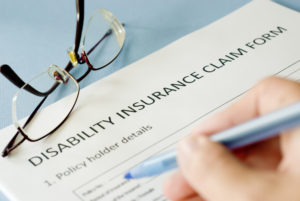A person who is disabled may be able to avail themselves of private short or long term disability benefits. Not everyone has access to short or long term disability benefits. Unlike Social Security benefits, short and long term disability benefits are based on a private contract of insurance. Usually, short and long term disability benefits are obtained either as a group benefit of employment or are individually purchased from an insurer on the open market in a manner similar to obtaining a life insurance policy. Policies obtained through an employer are often paid for by the employer, while private policies are paid for by the individual. If you do not have this coverage through your job or a private insurance policy, then short or long term disability benefits may not be available to you.
Disability benefits are designed to provide some wage replacement during the time period a person is disabled due to illness, injury, or a combination of these factors. Generally, any type of disability is covered, regardless of cause. Unlike Workers’ Compensation benefits, a short or long term disability claimant does not generally have to prove that her or his disability stems from a work-related cause.
Short and long term disability benefits can be provided separately or in conjunction with one another. The usual practice is that disability that lasts less than six months is considered to be short term, while disability lasting longer than six months is long term. Often, these coverages are provided together, so that disability that lasts longer than the short-term period becomes a claim for long term disability after the short term period expires.
As these coverages are governed by contracts, it is highly recommended that a potential claimant for short or long term disability insurance obtain a copy of that contract, or at least a copy of the Summary Plan Description, from their employer or insurer. Each policy can be different, and these policies often have short filing deadlines or brief appeal periods which must be timely complied with or valuable rights can be lost. Know what you are dealing with and take steps to protect your rights by getting a copy of that insurance contract.
Most policies that combine short and long term disability benefits pay a percentage of your wages lost to disability based on the number of weeks the claimant is out of work. Usually, short term disability benefits begin as a high percentage of your income, sometimes as high as 90%. As time goes on, and generally by the time long term disability benefits commence, the percentage of pre-disability income provided can drop, sometimes to 50% of pre-disability earnings. How your pre-disability income is calculated and the percentage of it you would receive is governed by the specific policy of insurance.
The definition of disability can vary from contract to contract. Some insurance policies require the claimant to be disabled just from their pre-injury employment, and others may require that the claimant be disabled from any employment. Again, the insurance contract controls.
It must be kept in mind that short and long term disability benefits only cover lost wages. Private disability benefits generally do not cover medical expenses, whether related to the disabling condition or not. If the policy is provided through your employer, the employer may choose to keep you covered by their medical plan, or you may be able to continue your medical coverage via COBRA. Medical coverage for you and your family can be a significant issue.
Many times, obtaining and keeping short and long term disability coverage is as simple as filling out the required forms and providing medical information from your doctors that support the claim that you are unable to work. However, sometimes insurers may unjustly deny or prematurely terminate benefits. Insurers have been known to improperly delay investigation of a claim, delay deciding a claim or payments that are due, or pay only part of the benefit owed. There may be inappropriate multiple requests for medical information, or it may become difficult to get a response from your claim representative.
If you are facing or having difficulty with a claim for short or long term disability benefits, please contact a High Swartz attorney. Our Bucks County and Montgomery County disability attorneys have knowledge and experience in all facets of disability issues. Let us help you get the Social Security disability benefits you have earned.
The information above is general: we recommend that you consult an attorney regarding your specific circumstances. The content of this information is not meant to be considered as legal advice or a substitute for legal representation.
